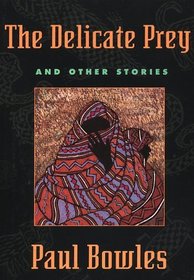Helpful Score: 2
Paul Bowles once said that a story should remain taut throughout, like a piece of string. That tense, stretched tone is the key to this collection of 17 eerie tales by the author best known for The Sheltering Sky. This book is dedicated, "For my mother, who first read me the stories of Poe." If Poe had lived in Mexico, and he'd had ice-water in his veins to counteract that feverish romanticism, he might have crafted something like these odd vignettes about human frailty and cruelty.
Tobias Wolff wrote an interesting review (in Esquire) of this collection: "The Delicate Prey is in fact one of the most profound, beautifully wrought, and haunting collections in our literature ... Bowles's tales are at once austere, witty, violent, and sensuous. They move with the inevitability of myth. His language has a purity of line, a poise and authority entirely its own, capable of instantly modulating from farce to horror without a ruffle..."
Now I find Wolff's praise to be a bit overblown, but I do connect strongly with the phrases "inevitability of myth" and "poise and authority." That's what you respond to, when you're reading these tales--the feeling that everything has already happened, either in future history, or in long distant past, and also that tremendous sense of authority that only true myth can convey.
Finally, what lingers, now that it's been some years since I read the book, is intense awareness of setting. It's a night world, where palm trees are like "shiny green spiders," where bats reel silently overhead in a jet-black sky, where a hot relentless wind blows across deserted plazas.
--Fiona
Tobias Wolff wrote an interesting review (in Esquire) of this collection: "The Delicate Prey is in fact one of the most profound, beautifully wrought, and haunting collections in our literature ... Bowles's tales are at once austere, witty, violent, and sensuous. They move with the inevitability of myth. His language has a purity of line, a poise and authority entirely its own, capable of instantly modulating from farce to horror without a ruffle..."
Now I find Wolff's praise to be a bit overblown, but I do connect strongly with the phrases "inevitability of myth" and "poise and authority." That's what you respond to, when you're reading these tales--the feeling that everything has already happened, either in future history, or in long distant past, and also that tremendous sense of authority that only true myth can convey.
Finally, what lingers, now that it's been some years since I read the book, is intense awareness of setting. It's a night world, where palm trees are like "shiny green spiders," where bats reel silently overhead in a jet-black sky, where a hot relentless wind blows across deserted plazas.
--Fiona




